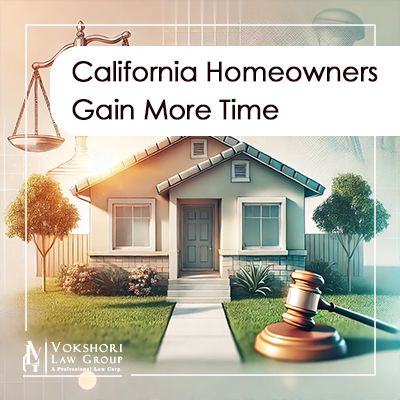
On January 1, 2025, a new law in California came into effect, offering critical protections to homeowners facing foreclosure. This legislation provides additional time for homeowners to sell their property and avoid losing it to foreclosure. Specifically, the law grants a 45-day extension for homeowners who sign a listing agreement with a licensed real estate agent, with an additional 45-day extension if the property goes into escrow. Here’s what you need to know about this important change and how it could help you or someone you know.
How the Law Works
The new law aims to give homeowners in distress more breathing room to sell their properties on the open market rather than losing them to foreclosure auctions, which often result in lower sales prices and devastating financial consequences.
- Listing Agreement Extension (45 Days):
- If the trustee receives a sales listing agreement for the property with a California licensed real estate broker to be placed in a publicly available marketing platform, at least five business days before a scheduled trustee’s sale, the foreclosure process is delayed by 45 days. This allows the homeowner to market the property and find potential buyers.
- Escrow Extension (Additional 45 Days):
- If the borrower provides the trustee with a bona fide and fully executed purchase agreement at least five business days prior to the postponed sale date, the servicer or trustee must postpone the scheduled sale date for an additional 45 days. The purchase agreement must include the following:
- A purchase price equal to or greater than the unpaid balance of all obligations secured by the property.
- The name of the buyer, sales price, agreed closing date, and acceptance by the designated escrow agent.
Relevant Civil Code Section and Legislative Language
The provisions of this law are codified in California Civil Code Section 2924f(e)(1). The important details include:
- Listing Agreement Extension:
- For residential properties with up to four units, the trustee must postpone the foreclosure sale by 45 days if they receive a listing agreement at least five business days before the scheduled sale. The listing agreement must be sent via certified mail or overnight courier with tracking and confirm delivery, and it must include a California licensed broker placing the property on a publicly available marketing platform. This provision can only be used once to delay the sale.”
- “If the trustee receives, at least five business days before the date of sale, a copy of a valid listing agreement with a licensed real estate broker, the trustee shall postpone the sale to a date at least 45 days after the date of the scheduled sale.”
- Purchase Agreement Extension:
- If the trustee receives, at least five business days before the date of sale, a copy of an executed purchase agreement, the trustee shall postpone the sale to a date at least 45 days after the date on which the purchase agreement was received by the trustee.
Legislative Intent and Comments
The California Legislature enacted this law to provide homeowners with a fair opportunity to sell their properties and preserve their equity, rather than losing their homes through foreclosure. However, the law has limitations. Critics note that there are no requirements for listing prices to be reasonable, and there is no safeguard against delays caused by borrowers entering into sham purchase agreements with “straw men” buyers who do not intend to complete the transaction.
Proper Channels for Notifying the Servicer
To ensure compliance with the law and protect their rights, homeowners must follow these steps:
- Notify the Trustee:
- Homeowners or their agents must provide the trustee with a copy of the signed listing agreement or purchase agreement. This must be done at least five business days before the scheduled foreclosure sale.
- Documentation Requirements:
- Include the listing agreement or purchase agreement along with any necessary identifying information, such as the property address and loan number.
- Retain copies of all correspondence and proof of delivery (e.g., certified mail, email confirmation, or fax receipts).
- Follow Up:
- Confirm receipt with the trustee or loan servicer. Request written confirmation that the foreclosure sale has been postponed.
How Homeowners Can Protect Their Rights
- Act Promptly: Time is of the essence. Sign a listing agreement or secure a buyer as soon as possible to trigger the extensions.
- Work with Professionals: Engage a licensed real estate agent experienced in distressed property sales. An attorney can also help ensure proper notice is given to the trustee or servicer.
- Keep Records: Maintain copies of all agreements, communications, and delivery receipts to document compliance with the law.
- Monitor Progress: Stay in regular contact with the trustee or servicer to confirm that your rights under the law are being honored.
Legal Support for Homeowners
While this law provides extra time, navigating foreclosure and selling a home under distress can still be complex. Consulting with an experienced real estate attorney can help ensure you understand your rights and options, avoid common pitfalls, and negotiate favorable outcomes. An attorney can also review listing agreements, advise on escrow terms, and assist with any disputes that may arise during the process.
Conclusion
The new 2025 California law offers a lifeline to homeowners at risk of foreclosure by giving them more time to sell their property. If you or someone you know is facing foreclosure, act quickly to leverage these new protections. Reach out to a qualified real estate agent and attorney to get the support you need to navigate this challenging time and achieve the best possible outcome.
For more information or to schedule a consultation, please contact Vokshori Law Group at (855) 855-2608 or visit www.VokLaw.com to learn more.






